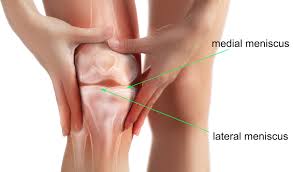What is a meniscus tear?
A meniscus tear is very common among people who enjoy sports. It can happen easily when a person changes their direction suddenly while running or jumping. It can often occur at the same time as another knee injury, such as an ACL injury. Considered one of the most frequently occurring knee injuries, it can be very painful.

The meniscus is a piece of cartilage in your knee that helps cushion and stabilise the joint and protects the bones from normal wear and tear. You can damage the meniscus quite easily by simply twisting your knee in the wrong direction. In some cases, a piece of the shredded cartilage breaks away and catches within the knee joint to cause pain and discomfort.
What are the early signs and symptoms of a meniscus tear?
When you first injure your knee, the pain may not feel too bad and you may even continue to play sports that day. But once inflammation ensues, your knee will start to become painful and your range of movement will be limited.
Your symptoms may include:
- Pain in the knee
- Swelling
- A popping sensation during the injury
- Difficulty bending and straightening the leg
- Your knee getting stuck in a position
How is a meniscus tear diagnosed?
Your doctor or physiotherapist will give you a thorough examination, looking at both your knees to compare them and see if there is any swelling. They will want to hear when and how you sustained your injury. They will also carry out some tests to help their diagnosis. You may be referred for imaging, often an MRI scan, for clarity.
How do you treat a meniscus tear?
There are many meniscus tears that do not require any surgery and heal with time, rest, and physiotherapy. To speed your recovery, you can:
- Rest the knee and limit activities
- Ice
- Compression
- Elevate
- Use crutches to put less pressure through the knee
- Take anti-inflammatory medications
- Physiotherapy to help strengthen and reduce the stress to your knee
- Avoid any impact activities such as jumping and running
If none of the above help your pain or mobility, you may require surgery to repair the tear.
What happens during a meniscus repair surgery?
A meniscus repair is done using a small camera (arthroscope) and will normally takes around one hour. Once the surgeon can see inside your knee with the arthroscope they will be able to determine the severity of the injury. If they think the meniscus can be repaired, they will do it there and then. This will involve suturing the torn edges back into place and allowing the meniscus to heal on its own. In other cases a partial meniscectomy is required. This when they remove part of the meniscus and leave the healthy tissue intact.
Surgeons will always try to repair the meniscus rather than remove it as it will make for a quicker and easier recovery. Preservation of your knee joint is key to minimise the risk or arthritis in later life.
How long does it take for a torn meniscus to heal after surgery?
This depends on a number of factors, including the severity of your meniscus tear. Everyone recovers at different speeds so your physiotherapist will be able to advise you on a time frame according to your progress. Physiotherapy is always used after surgery to minimise any complications and speed up recovery.
What happens after surgery?
Your physiotherapist will get you to walk around on crutches and climb the stairs as soon as possible, most likely on the same day. Once you are discharged, your physio will tailor your exercises. These will help you to:
- Regain control of the leg muscles
- Wean you off your crutches
- Regain full knee motion
- Regain leg/knee strength and get you back to normal daily physical activities
How physiotherapy can help
We will do whatever we can to get you on the fastest route to recovery. Some of the treatment methods we use include:
- Mobilisation
- Strengthening exercises
- Myofascial trigger point release
- Pilates
- Cross-friction massage
- Stretching and range of movement exercises
- Acupuncture
- Functional exercises
- Kinesio-taping
